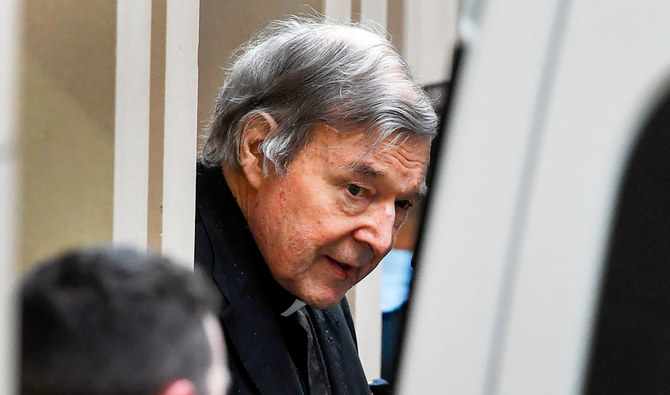MELBOURNE: Former Vatican treasurer Cardinal George Pell lost an appeal against his conviction for sexually abusing two 13-year-old choir boys and will remain in prison for at least another three years, an Australian court ruled on Wednesday.
Pell, the highest ranking Catholic worldwide to be convicted of child sex offenses, was sentenced in March to six years in jail after being found guilty on five charges of abusing the two boys at St. Patrick’s Cathedral while he was Archbishop of Melbourne in the late 1990s.
Supreme Court of Victoria Chief Justice Anne Ferguson said on Wednesday that two of the three judges hearing Pell’s appeal “decided that it was open to the jury to be satisfied beyond reasonable doubt that Cardinal Pell was guilty of the offenses charged” and rejected his appeal.
The jury in the trial heard testimony from a victim who described how Pell had exposed himself to the two boys, fondled their genitals and masturbated and forced one boy to perform a sex act on him. The other victim died in 2014.
“I am grateful for a legal system that everyone can believe in, where everybody is equal before the law and no one is above the law,” the surviving choir boy, now in his 30s, said in a statement read out by his lawyer, Vivian Waller of Waller Legal.
“The criminal process has been stressful. The journey has taken me to places that, in my darkest moments, I feared I could not return from,” he said in the statement.
Under the terms of his sentencing, Pell will be eligible for parole in October 2022, when he will be 81.
“Cardinal Pell is obviously disappointed with the decision today,” his spokeswoman, Katrina Lee, said in a statement, adding that he maintained his innocence.
She said his legal team was examining the judgment to determine whether to lodge a special leave application to the High Court of Australia to hear an appeal. Pell has 28 days to file the application.
There was no immediate comment from the Vatican.
Pell appealed his conviction to Victoria’s Court of Appeal on three grounds, but mainly on the argument that the jury’s verdict was unreasonable based on the evidence at the trial.
However the court ruled in a 2-1 judgment that the conviction was reasonable, with two judges saying the surviving victim was a “compelling witness, was clearly not a liar, was not a fantasist and was a witness of truth.”
“As might have been expected, there were some things which he could remember and many things which he could not. And his explanations of why that was so had the ring of truth,” said the two judges.
In contrast they said the evidence by people supporting Pell varied in quality and consistency.
They dismissed Pell’s argument that sexual abuse would have been physically impossible due to his heavy robes, saying “the robes were capable of being maneuvered in a way that might be described as being moved or pulled to one side or pulled apart.”
Outside the court in Melbourne, small groups of activists and victims of abuse cheered once they heard the verdict.
“Here we have today in our court, in Victoria, the Supreme Court, saying, ‘we believe the victim and we uphold the jury’s verdict’,” Chrissie Foster, a prominent advocate for victims who has followed the case, told reporters.
“No one is above the law,” she said.
STILL A CARDINAL
The pope has previously said he would wait for Australian civil justice to take its course before commenting on the case publicly.
Pell is still a Cardinal in the Catholic Church. Even if he resigns as a cardinal, he would still be a priest.
Before he could be dismissed from the priesthood, the Vatican’s Congregation for the Doctrine of the Faith (CDF) would have to find him guilty following a separate canonical trial or abbreviated procedure, known as an “administrative process.”
The CDF has been looking into the accusations against Pell since his conviction in Australia.
Prime Minister Scott Morrison said the courts had done their job and the justice system must be respected. He also said he expected Pell would lose his Australian honors.
Pell was made a Companion of the Order of Australia in 2005 and awarded a Centenary Medal in 2001.
Pell’s legal team had appealed his conviction on three grounds, but the three appeal judges only permitted the unreasonable verdict argument to be heard.
The dissenting view from Justice Mark Weinberg said the victim “was inclined to embellish aspects of his account” and he said the evidence contained enough discrepancies and inadequacies to cause him to doubt Pell’s guilt. Weinberg said that in his view the convictions could not stand.
Pell’s case has attracted global attention as it brought a growing crisis of sexual abuse in the Catholic church spanning scandals in the United States, Chile and Germany right to the heart of the papal administration.
The Australian judges said Pell should not be made a “scapegoat for any perceived failings of the Catholic church nor for any failure in relation to child sexual abuse by other clergy.” They said his conviction and sentence was not vindication of the trauma suffered by other victims of abuse.
The Australian Catholic Bishops Conference, the Catholic church’s top body in Australia, said it accepted the court’s decision and acknowledged the pain that those abused by clergy have experienced through Pell’s trials and appeal.




























